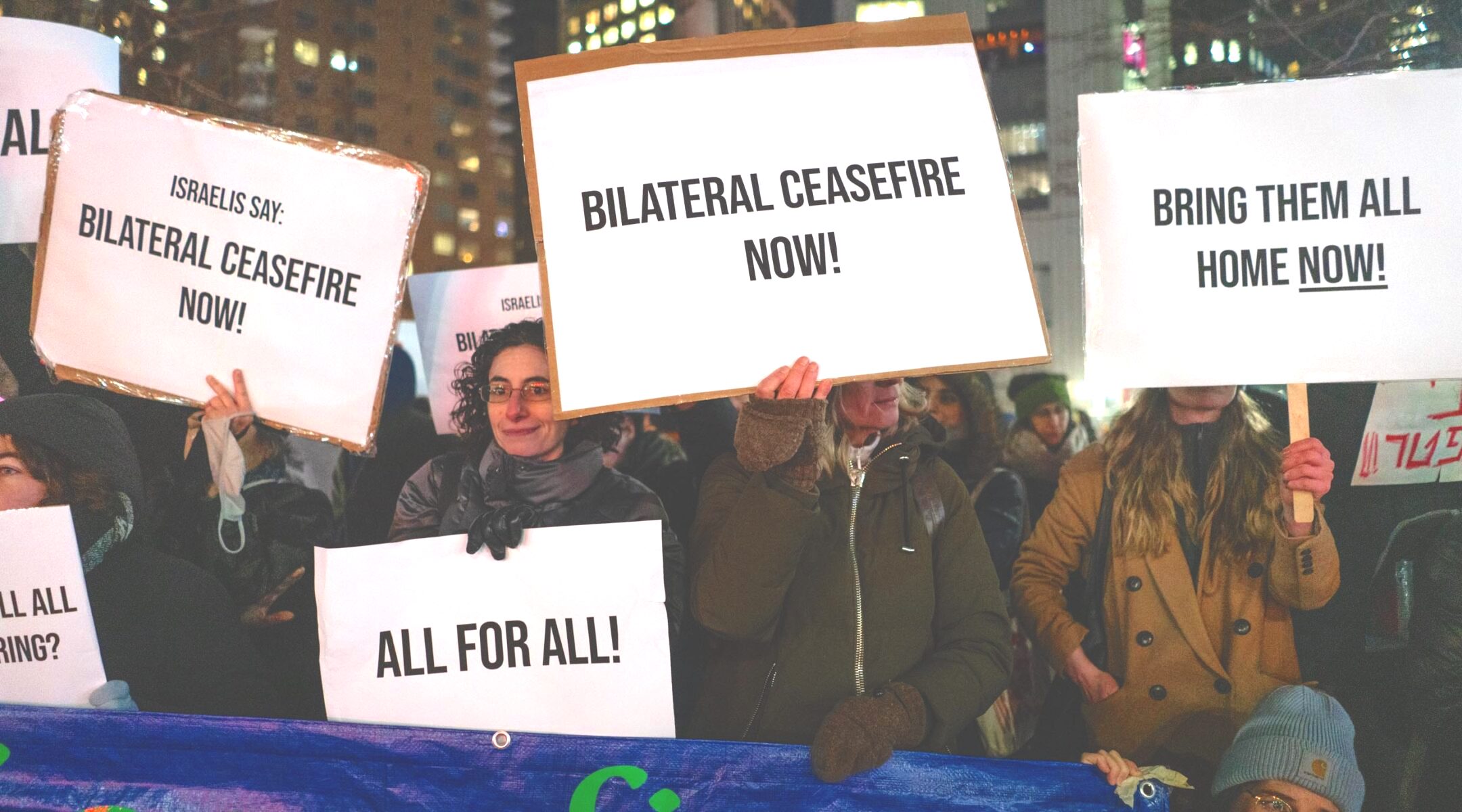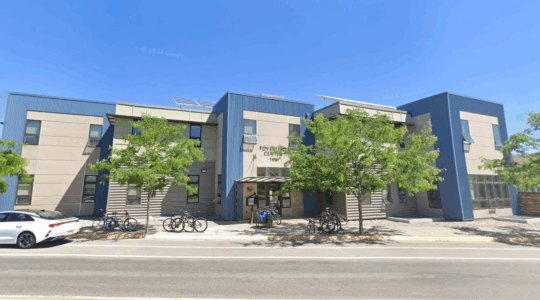(New York Jewish Week) — A crowd of activists gathered in the bitter cold in Columbus Circle. To the beat of a snare drum, they chanted in Hebrew and English for a ceasefire and the return of Israeli hostages
“Safety is what peace delivers, war never has a winner,” around 100 demonstrators chanted at the rally earlier this month. Some protesters carried signs that read, “Israelis say there is no military solution” and “Not one more drop of blood.”
The protesters, loosely organized as the Anti-Occupation Bloc, are Israeli Jews who came together a year ago to protest Prime Minister Benjamin Netanyahu’s plans to overhaul Israel’s judiciary. After the deadly Hamas attacks of Oct. 7 and weeks of bloody fighting, members pivoted to create a distinctly left-wing Israeli response to the war: a deep distrust of Netanyahu, an empathy for those suffering on both sides, a belief in coexistence and the conviction that the West Bank occupation is detrimental to both Israelis and Palestinians.
“We’re arguing that pro-Palestine and pro-Israel is one and the same. [We] Israelis are not benefiting from living in eternal war,” said Tamar Glezerman, an activist with the group.
“I myself have not benefited from that, I’ve only lost,” said Glezerman, a filmmaker whose aunt was killed on Oct. 7 at Kibbutz Be’eri.
The activists say they do not feel aligned with other protest groups in the city, who on one side they consider unsympathetic to Israelis, and on the other, uncaring toward Palestinians.
They advocate for both Israelis and Palestinians in the conflict, even as they work to process the Oct. 7 attack and its aftermath themselves.
The goal of their events is to show “there’s pain on both sides, that we don’t try to compare,” said activist Tzlil Rubinstein. “This is not a competition of who suffers more.”
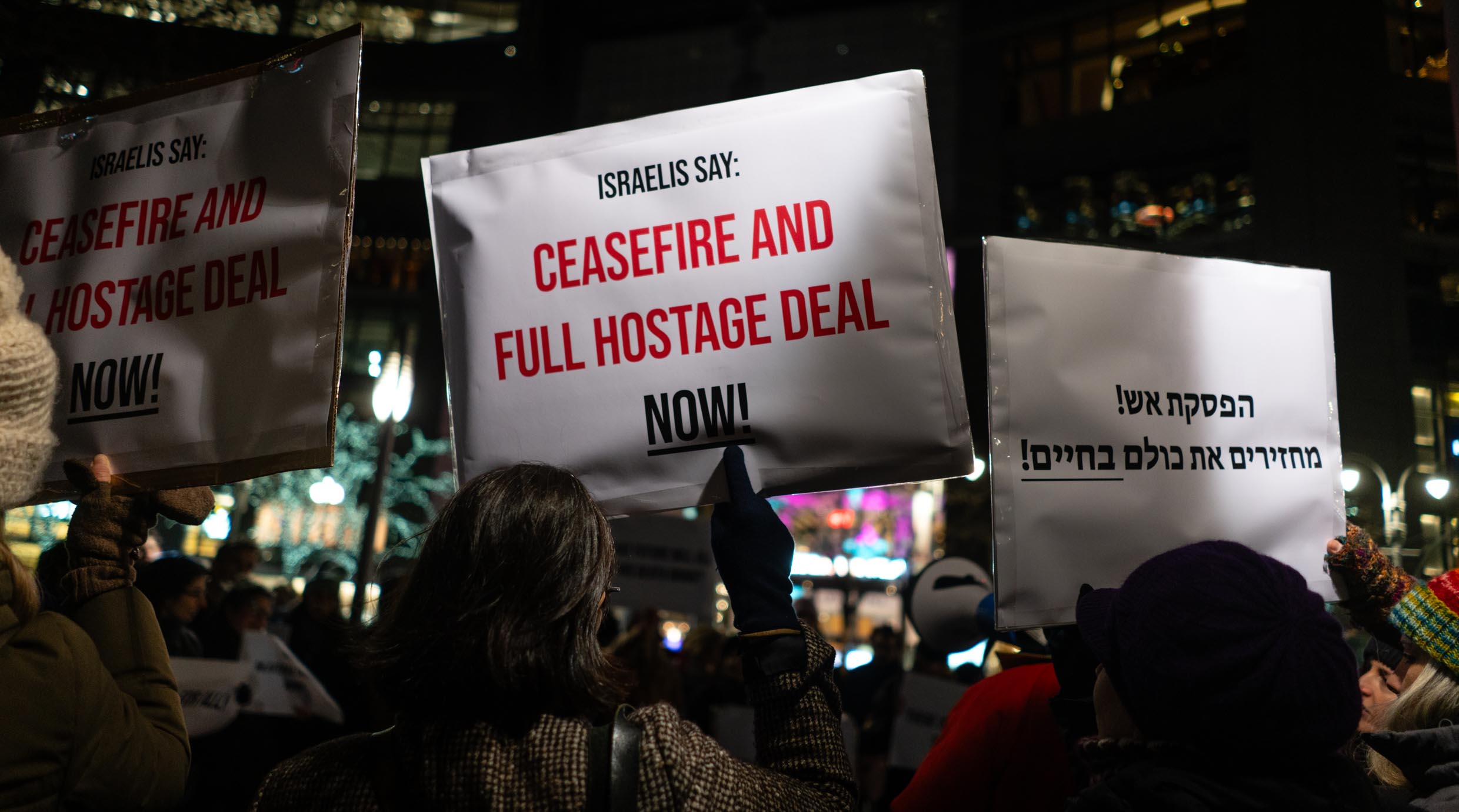
Left-wing Israelis protest in support of a Gaza ceasefire and the release of Hamas hostages, in midtown Manhattan, Dec. 20, 2023. (Luke Tress)
The group started a year ago, after efforts by Israel’s right-wing and religious ruling coaliton’s plans to weaken Israel’s judiciary set off sustained, massive protests in Israel. The leftist Israelis joined weekly rallies in Washington Square Park, but did not feel completely aligned with other protesters’ pro-Israel patriotism. The early rallies were led by activists from Israel’s left, but were focused on the judicial overhaul and democratic rights, and not on Israel’s treatment of the Palestinians.
“It was just very awkward for us to stand in demonstrations in the center of New York full of Israeli flags, very, very Zionist. It’s just not our politics,” said Maya Herman, a PhD student in sociology at the New School and a co-founder of the Anti-Occupation Bloc.
“It’s not that we’re against the State of Israel, but we don’t associate with that,” she said, arguing that Israel is not a “clear-cut case of liberal democracy” due to the control it asserts over West Bank Palestinians.
Members of the leftist faction decided to organize a protest group of their own. They set up a WhatsApp group called “Israelis in New York – the radical group,” and added 15 acquaintances, Herman said. The group slowly grew as members enlisted friends and met like-minded activists at events, but it remained part of the larger pro-democracy protest movement.
“We never tried to make our own demonstrations. The point was to be part of the mainstream movement and make sure the mainstream thought about the radical left side,” Herman said.
That approach changed ahead of New York City’s annual Celebrate Israel Parade, which in June drew a contingent of prominent Israeli government ministers, including Knesset member Simcha Rothman, a leading force in the judicial overhaul legislation. Rather than march in a parade that included government ministers and right-wing American groups, including pro-settlement organizations, the “radical group” decided to hold their first separate demonstrations, which drew between 100 and 150 participants, Herman said. The activists heckled Rothman and other ministers from the sidelines of the parade with shouts of “Shame” in Hebrew and held a rally near the hotel where Netanyahu was staying for the U.N. General Assembly.
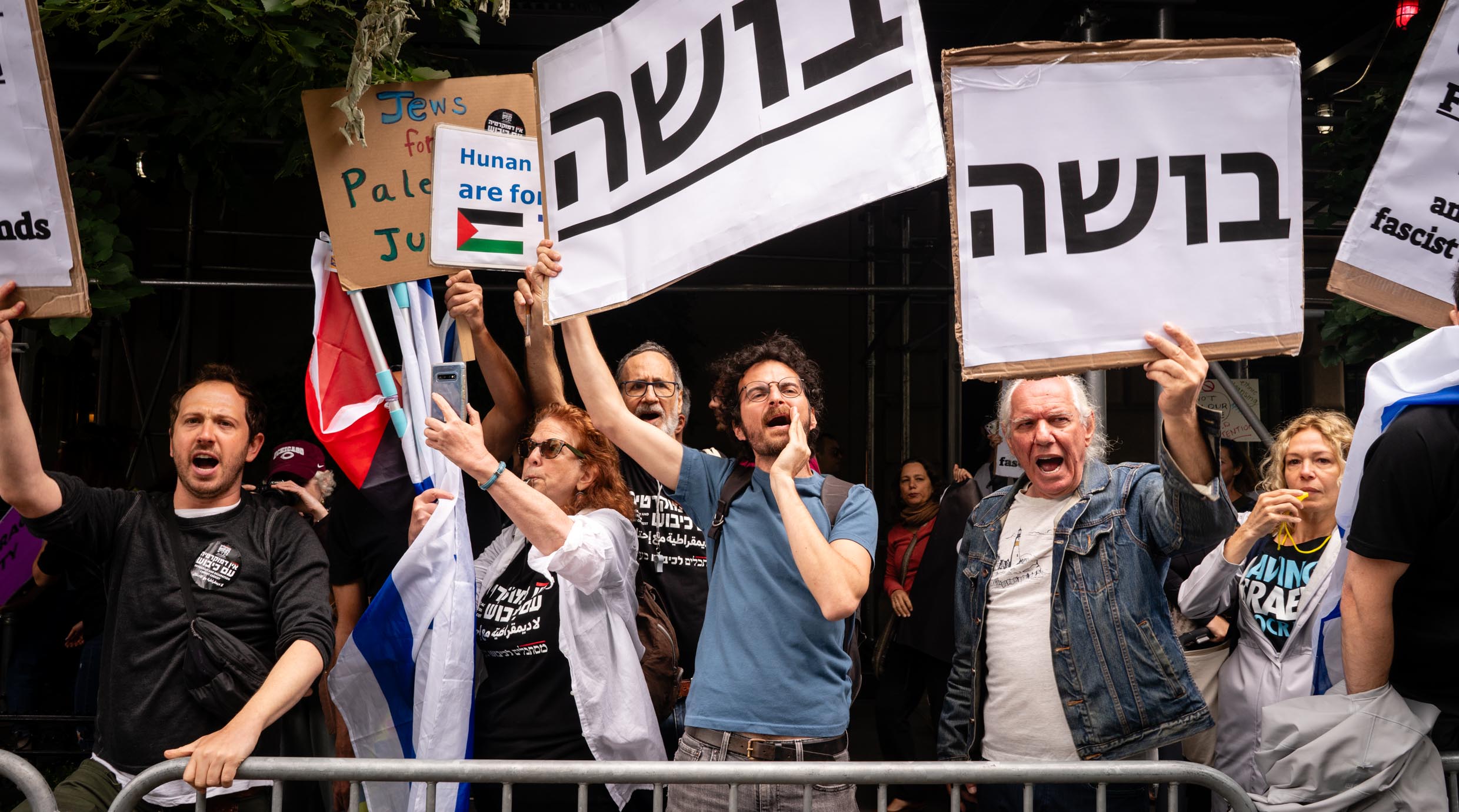
Left-wing Israelis protest against visiting Israeli government ministers during New York’s annual Celebrate Israel Parade, in midtown Manhattan, June 4, 2023. The signs read “shame” in Hebrew. (Luke Tress)
“It was a boost of adrenaline for the group,” said Herman, stressing that the activists still backed the larger pro-democracy protest movement and its organizers. “That moment in June really made the group much bigger and a group that is doing things by itself.”
Around the same time, the activists decided to call themselves the Anti-Occupation Bloc, affiliating with a group of the same name in Israel. As the bloc came together, members became friends outside of demonstrations, sometimes going out for drinks or having picnics around the events.
“It’s people who actually are Israelis in their identity, that they can hate it or love it, but that’s part of who they are,” Herman said. “I think that was something that was really missing — Israelis thinking left politics with other Israelis.”
Members of the group are generally politically active, but vary widely in their political views, age and the length of time they have been in New York. The core principles are non-violence and a focus on equal rights for all Israelis and Palestinians, even if opinions differ about how to achieve those aims, said Rubinstein. The group is informal, loosely organized and does not have a charter or official talking points. Rubinstein said the group’s members support Knesset parties ranging from the Arab-led factions to the center-left Labor.
The New York Anti-Occupation Bloc continued to coalesce ahead of Netanyahu’s visit to New York in September for the General Assembly and a meeting with President Joe Biden. The activists’ WhatsApp group grew to around 190 members during those events, and around 30 protesters turned out for some rallies, the last demonstrations before the Oct. 7 attack.
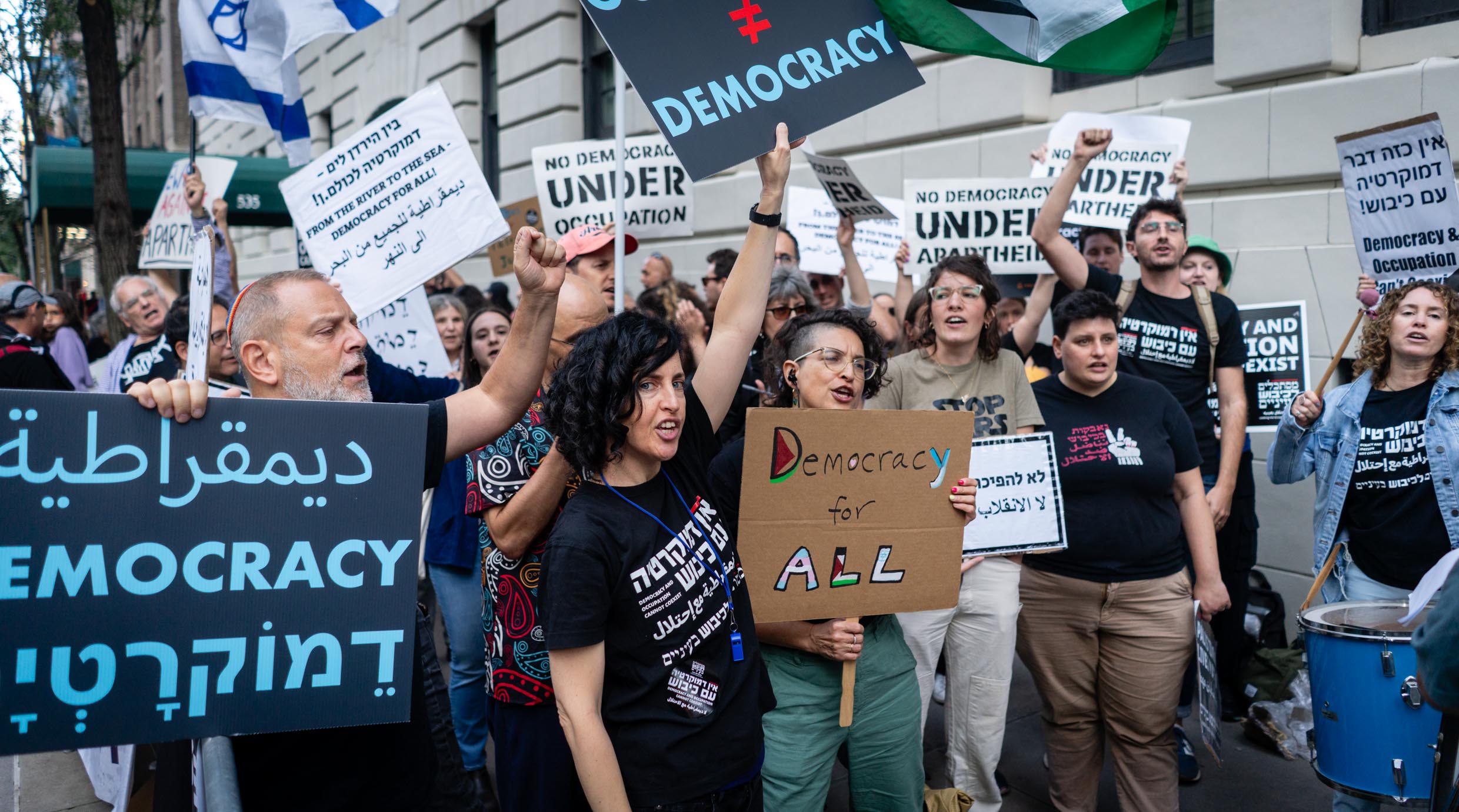
Left-wing Israelis protest against Israeli Prime Minister Benjamin Netanyahu during his visit to New York for the U.N. General Assembly, in midtown Manhattan, Sept. 19, 2023. (Luke Tress)
The enormous horror of the Hamas onslaught rocked the group along with the rest of the Jewish world. Some members of the bloc have friends or family members who were murdered or kidnapped; others became isolated from friends in New York who couldn’t or wouldn’t appreciate their pain. Herman was horrified by the images of destroyed communities in southern Israel that reminded her of the kibbutz in central Israel where she grew up. The activists had believed the occupation of the West Bank and the blockade of Gaza would lead to a disaster, but never envisioned the tragic dimensions of Oct. 7.
Protest activities halted, but the WhatsApp group buzzed with hundreds of messages a day, and kept drawing new members. Many of the activists were distraught and having a hard time getting through the day. “It’s a collective grief even if you’re not in Israel,” Herman said. The group became an emotional space where the activists could commiserate, start to process their shock and grief, and grapple with fundamental questions.
“We got to these really crazy moments of retrospective thinking,” Herman said. “Does it even matter to be political, to be activists, to do demonstrations? Can we change the reality?”
“It was a really deep existential crisis that is still bubbling beneath,” she said.
The war immediately put an end to the judicial overhaul legislation in Israel, and the protests against the process. The mainstream Israeli protest groups in Israel and the U.S. shifted their focus to supporting victims of the Hamas attacks, displaced Israelis, grieving families and the war effort, as the government floundered in its initial response.
As the shock of the attack wore off and the Anti-Occupation Bloc activists started to get back on their feet, they struggled to find a place among the array of protest groups taking to the streets around New York. Other Israeli protesters in the U.S. dedicated themselves to freeing the more than 200 Israelis held hostage by Hamas. The captives are also a priority for the Anti-Occupation Bloc, but the group wanted to push for a ceasefire. That ostensibly aligned them with far-left Jewish groups like Jewish Voice for Peace, but members of the Anti-Occupation Block felt these other leftist groups were unsympathetic to Israelis immediately after Oct. 7.
“We were just invisible to a lot of these groups when it all started on Oct. 7. A lot of these groups didn’t even mention what happened to Israelis,” Rubinstein said.
Herman said many leftist groups “immediately went to their regular spiel of Nakba [“disaster,” the Palestinian term for the founding of Israel] and occupation.”
“We were like, ‘We agree on all of those concepts and all of those historical facts,’ but we also think Oct. 7 was a different moment,” Herman said. “You have to understand what happened there was an insane terrorist attack on civilian society.”
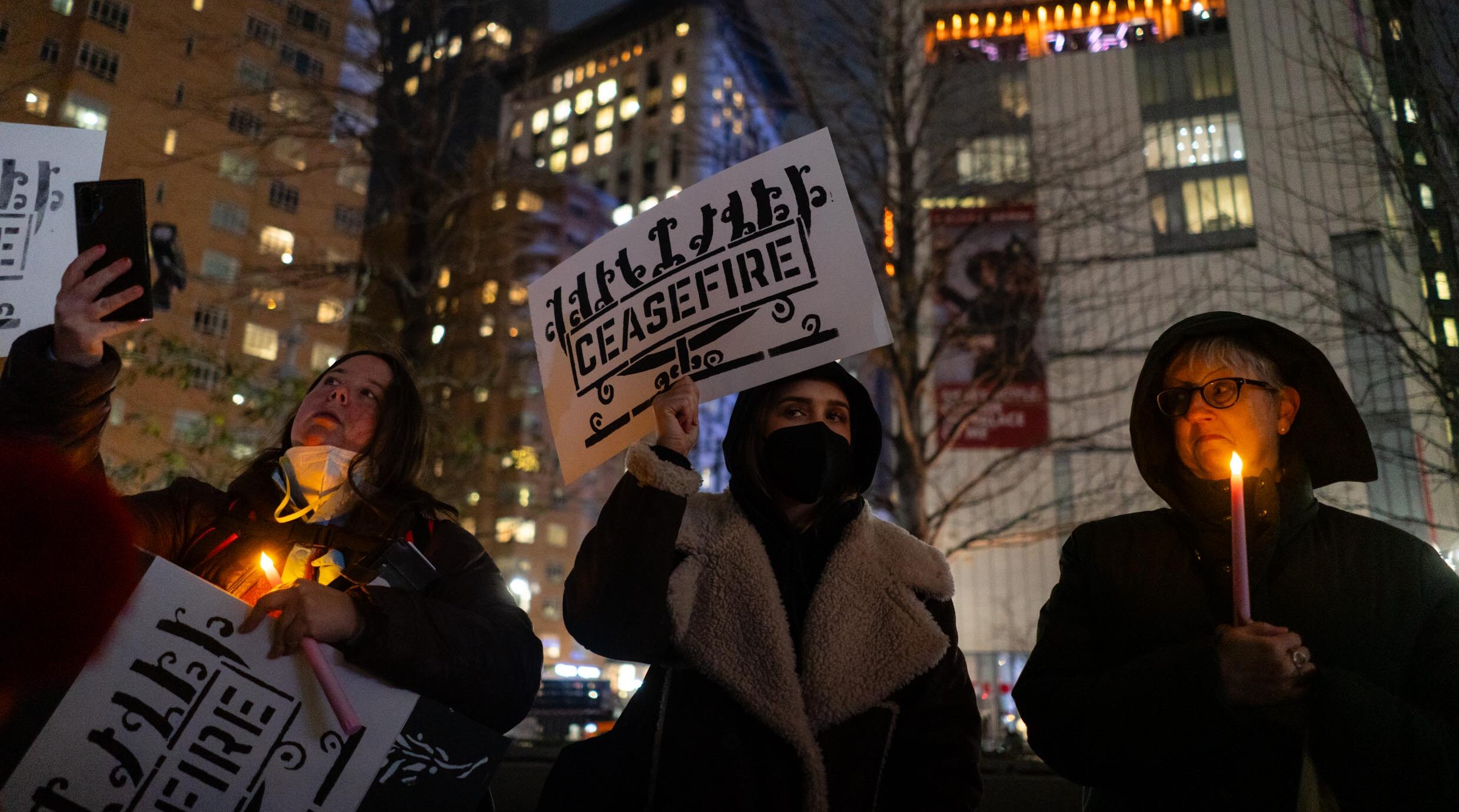
Left-wing activists led by American Jewish rabbis rally in support of a ceasefire between Israel and Hamas on the first night of Hanukkah in Columbus Circle, New York City, Dec. 7, 2023. (Luke Tress)
“To attack women, children, and to mutilate and use sexual violence? What happened there is legitimized political resistance? Not according to us,” she said. “It was a conversation that we never had in the past.”
The Israeli activists also conceptualize the conflict differently than the American Jewish left, where contentious divides yawn between Zionist and anti-Zionist positions and other rhetorical fault lines. The framework is alien to most Israelis, who “don’t necessarily think in these concepts,” Rubinstein said.
“At this point, I don’t even know what people mean here when they say ‘Zionism,’” Glezerman said. The terms and rhetorical battles are “much more relevant to identity politics here and it’s not really a discourse that we need to take a part in,” she said. The activists do not use any flags at their protests.
Non-Israeli groups on both sides also seemed disconnected from the actual situation on the ground in Israel and Gaza, and did not include Israeli voices, the activists said.
“When American Jews are calling, ‘Not in our name,’ Israelis stand on the side and say, ‘Who says it’s in your name?’” Herman said. “The State of Israel now is really trying to protect its citizens. It’s probably not doing a good job of it, as always, but that’s the realpolitik.”
As for the pro-Palestinian protests that draw thousands to the streets of New York on a regular basis, the Israeli leftists reject them for condoning violence and atrocities against Israelis. The protest group leading most of the events, Within Our Lifetime, endorsed the Oct. 7 attacks and marches with banners that read, “By any means necessary.” Some anti-Zionist Jewish groups have joined or endorsed the events, such as student groups from the City University of New York. The Anti-Occupation Bloc activists are overwhelmingly opposed to joining the protests, despite their shared support for Palestinians.
“Do you think it’s ok to kill all those people in the name of national liberation?” Herman said. “This is your vision for the future? Do you even have a vision for the future?”
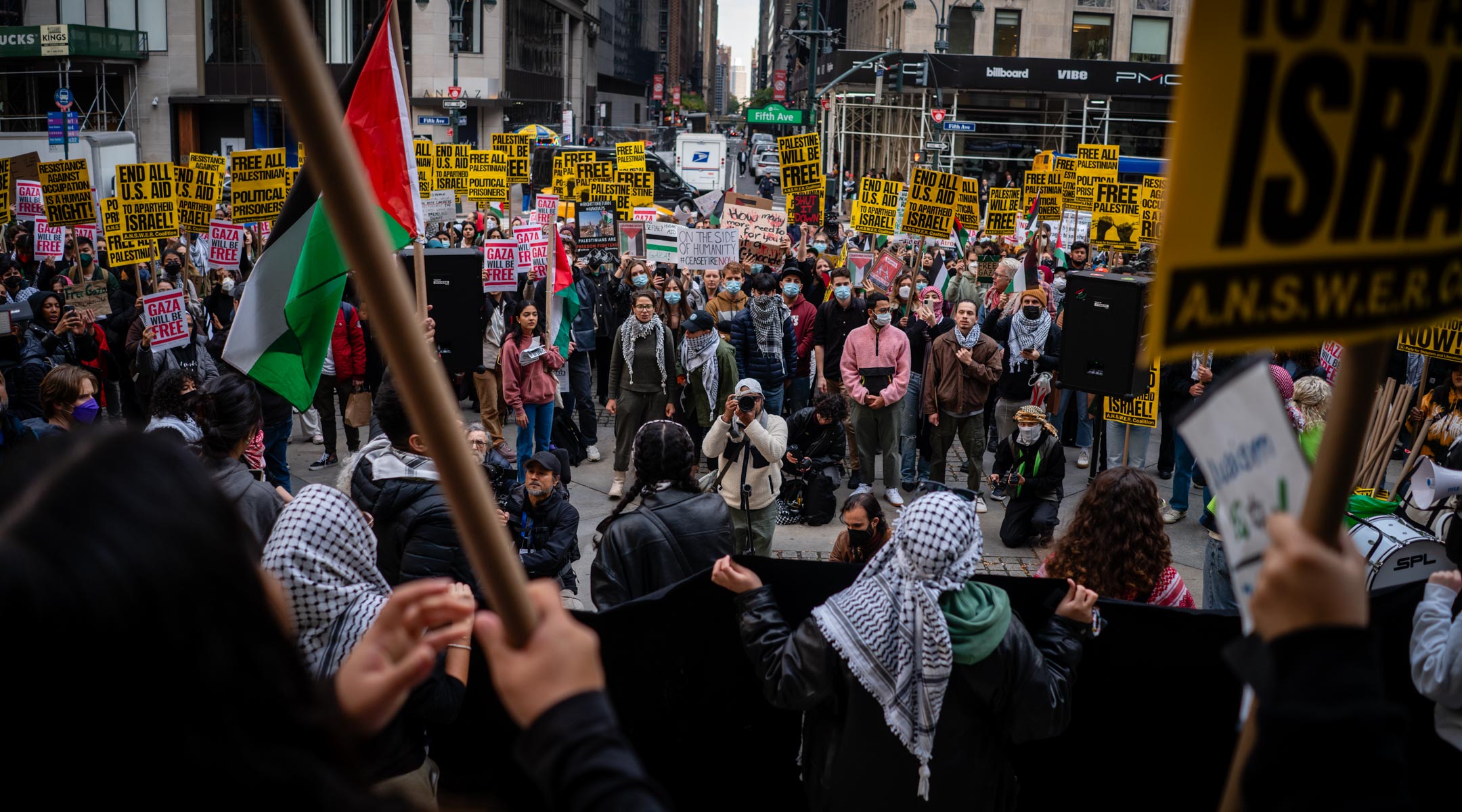
Pro-Palestinian protesters near Bryant Park following a high school student walkout in New York City, Nov. 9, 2023. Many Israeli leftists reject the large pro-Palestinian groups for condoning violence and atrocities against Israelis. (Luke Tress)
“You have so many things to say, all those words, like Israeli colonialism and settler violence and this and that, but no stakes in the game,” she said.
At the Columbus Circle rally, several hecklers in keffiyehs, the traditional Palestinian garment, shouted “Free Palestine” at the protesters, apparently identifying them as Israeli or pro-Israel supporters of the government. The Israeli demonstrators voiced their assent and responded with chants of “Ceasefire now.” The hecklers then switched to shouting “From the river to the sea” and “F–k Israel.”
The Anti-Occupation Bloc decided to hold another rally in early December at the Brooklyn Museum. The somber event was billed as a vigil for a ceasefire and release of hostages. The organizers said their demands also included humanitarian aid for Gaza, protection for West Bank Palestinians facing retribution from Jewish settlers and support for Arab citizens of Israel and activists on the ground. Glezerman said the different groups on all sides had omitted “parts of the narrative,” and that the Anti-Occupation Bloc was a “third alternative.”
The activists also said they have an opportunity to amplify the message in New York, where their leftist views are more widely accepted than in Israel, which has shifted toward the right in recent years and even more so since Oct. 7. Last month, Israeli police blocked a ceasefire rally in Tel Aviv, but later allowed the event after court intervention. Police in Israel have also detained social media commentators for backing the Palestinians, saying their posts could incite terrorism.
The leftists’ views, especially in calling for a ceasefire, remain unpopular both in Israel and among U.S. Jews. A poll released earlier this month found that 72% of American Jews approved of Israel’s response to the Oct. 7 attacks. Support for leftist parties in the Knesset has cratered in recent years, and has remained low since the war, according to recent polls. The dovish Meretz party did not win enough votes to secure Knesset representation in the last election. The bloc is also a small part of the tens of thousands of Israelis in New York, with around 270 members in its WhatsApp group today.
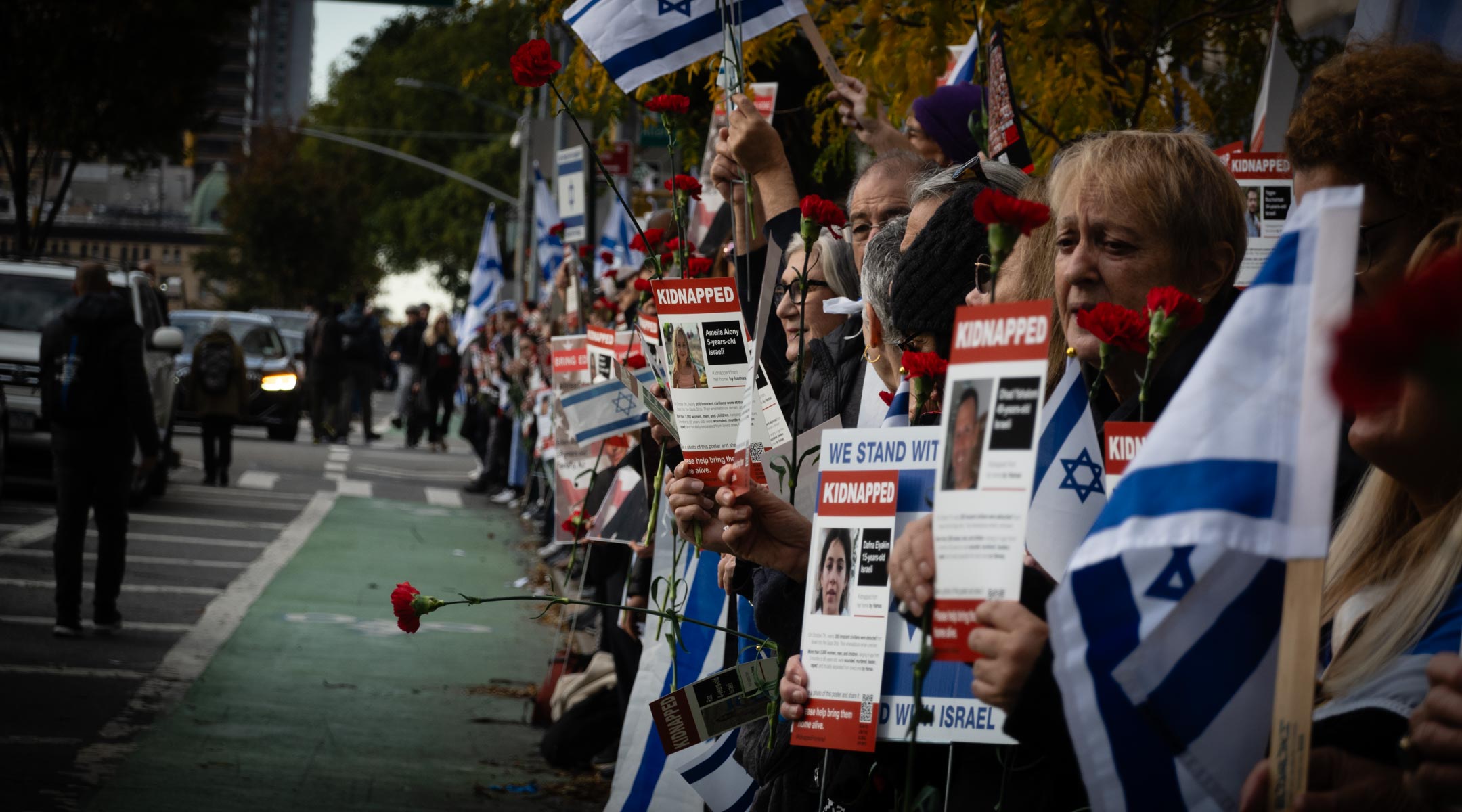
Israelis and supporters, outside the United Nations, rally in support of Israeli hostages taken by Hamas, Oct. 24, 2023. Many Israelis abroad rally around the hostages, but consider calls for a ceasefire premature. (Luke Tress)
Avital Shimshowitz, 54, an activist with the mainstream Israeli protest movement in New York, said she knows the Anti-Occupation Bloc protesters, and is “with the bloc in my heart.” But while she is also against the occupation, Shimshowitz has refrained from joining the group’s events because she believes they place too much blame on Israel for the current hostilities. She noted that the Anti-Occupation Bloc’s invitations for their events call for a ceasefire, the release of hostages and Netanyahu’s resignation, but don’t make demands on the Palestinian side.
“There’s no mention of Hamas, there’s no mention of any terror group, and for me, the terror group took our hostages and is also holding Palestinians hostage in Gaza,” said Shimshowitz, who protested against Netanyahu as part of the pro-democracy group UnXeptable and the Anti-Occupation Bloc before Oct. 7, and is also active in the Hostages and Missing Families Forum. “It points at Israel as the only player that can end this.”
Shimshowitz joined the Anti-Occupation Bloc for a protest in August after a settler killed a Palestinian and during the Celebrate Israel Parade, “but right now I don’t think that their message aligns with what needs to be done,” she said.
Beyond the immediate war, the Anti-Occupation Bloc activists are looking past a potential ceasefire toward a long-term solution to the conflict, even if the way forward is not yet clear. The repeated rounds of violence in recent decades were evidence, they said, that Israel’s approach was not working and new leadership was needed.
“We can’t continue doing this over and over again and expect something to change,” said Rubinstein, adding that most of the activists saw their future back in Israel. “We have to go back to the negotiating table to push for a solution, to be creative.”
The activists said that all sides need to accept that both Israelis and Palestinians are remaining on the land and will need to coexist. They also hope to enlist more American Jews in their movement, Herman said.
“I believe in a better future and it has to come with us demanding it,” she said.
The New York Jewish Week brings you the stories behind the headlines, keeping you connected to Jewish life in New York. Help sustain the reporting you trust by donating today.
